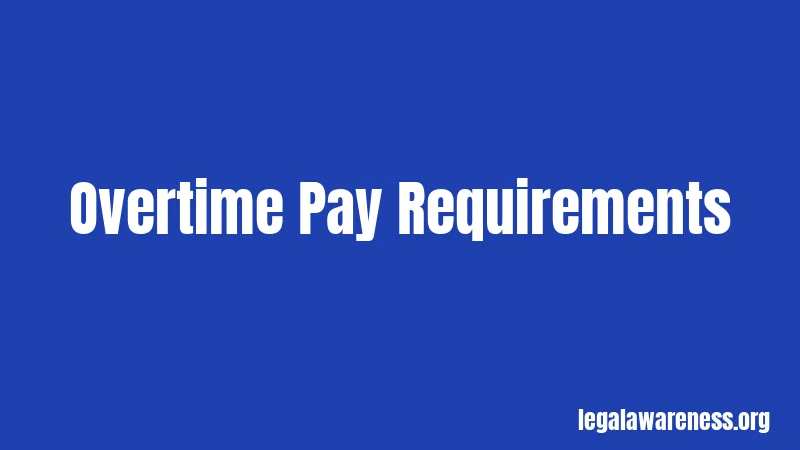Florida Salary Laws in 2026: Your Complete Wage Rights Guide
Most people don’t realize how many rules protect their paychecks. Florida has specific laws about how much you must be paid, when you get paid, and what employers can and cannot do with your wages. Let’s break down exactly what you need to know.
Whether you’re starting a new job or wondering if your employer is treating you fairly, understanding these laws matters. They protect your money and your rights as a worker.
What Are Florida Salary Laws?

Florida salary laws are rules that protect workers’ paychecks. They cover things like minimum wage, overtime pay, how often you get paid, and what your employer can deduct from your paycheck. These laws exist because workers deserve fair treatment and clear payment practices.
Think of them like a safety net for your income. They make sure employers follow the same rules across the state.
Florida’s Minimum Wage
Here’s something important: Florida minimum wage is higher than the federal minimum wage. As of 2025, Florida’s minimum wage is $14.00 per hour. The federal minimum is only $7.25.
You’re entitled to make at least Florida’s minimum wage. That means even if federal law allows less, you get the higher Florida amount. Most of the state follows this rule without exception.
Wait, there’s more. Florida’s minimum wage increases each year. In November 2024, voters approved a constitutional amendment to gradually raise minimum wage to $15 per hour by 2029. That means every year until 2029, the minimum wage will creep up a little bit.
How does this work? Florida adjusts minimum wage based on inflation. Starting in January 2026, the minimum wage will likely be higher than $14.00. The exact amount depends on inflation calculations. If you work in Florida, you should know what your state’s current minimum wage is.
Wondering if you should be making more? Check the official Florida Department of Economic Opportunity website for the exact current rate.
Overtime Pay Requirements

Overtime can be confusing. Let’s clear it up right now.
In Florida, overtime is governed by federal law, not state law. That’s important to understand. Federal law says employees working over 40 hours per week must receive overtime pay. Overtime pay is 1.5 times your regular wage.
Here’s the reality: your boss can’t just decide not to pay overtime. If you work 41 hours, you’re owed overtime for that one hour. It doesn’t matter if your employer doesn’t like it.
But here’s where it gets tricky. Some workers are “exempt” from overtime rules. Exempt workers don’t get overtime pay, even if they work 50 or 60 hours per week. This usually applies to managers, supervisors, and people in professional positions. However, just having a fancy job title doesn’t make you exempt. Your actual job duties matter most.
The key question: what do you actually do at work? If you make decisions, supervise others, and use professional judgment, you might be exempt. If you follow instructions and do specific tasks, you probably aren’t exempt.
Not sure if you’re exempt? Don’t just trust what your employer says. The rules are specific. You can contact the U.S. Department of Labor for clarity.
How Often Must You Get Paid?
Your employer can’t just pay you whenever they feel like it. Florida law requires regular paydays.
Most employers in Florida pay employees at least twice per month. Some pay weekly or biweekly. The key is consistency. Your employer must have a regular schedule and follow it.
Here’s what matters: you must know when you’re getting paid. Your employer should tell you the payday schedule. It shouldn’t be a surprise.
What if your employer delays your paycheck? That’s a problem. By law, employers must pay you on schedule. If they don’t, you might be owed extra money. Honestly, this is one area where many workers don’t stand up for themselves.
If you don’t receive a paycheck on the promised date, document it. Keep records. You may have legal options. In serious cases, you could file a complaint with Florida’s Department of Economic Opportunity.
Wage Deductions: What’s Legal and What’s Not

This part can get tricky, honestly.
Your employer can make certain deductions from your paycheck. But not every deduction is legal. Understanding the difference protects your money.
Legal deductions include federal and state income taxes, Social Security, and Medicare. Those are mandatory, and your employer must take them out. You agreed to these when you filled out tax forms.
Your employer can also deduct money for things you agreed to. Health insurance contributions, 401(k) contributions, and voluntary benefits are examples. But here’s the important part: your employer needs your permission.
Illegal deductions are the sneaky ones. Your employer cannot deduct money for:
Uniforms or work supplies (in most cases). Employers cannot charge you for uniforms or require you to buy your own unless it’s optional or covers costs they’d otherwise pay.
Cash register shortages. If the register is short $20, your boss can’t just take it from your paycheck. That’s not your fault.
Customer theft or damage. Your employer can’t make you pay if a customer steals or damages something.
Meals or refreshments. Some employers try to charge workers for work-related meals. This is often illegal, especially if meals are required or mandatory.
Mistakes or performance issues. Your employer can’t deduct pay because you made a mistake or work was slow.
Here’s the rule: any deduction must not bring your pay below minimum wage. Even if your employer claims you owe money, they can’t reduce your pay below the legal minimum.
Sound complicated? The basic idea is simple. Your paycheck is yours. Your employer can only deduct what’s legal and what you agreed to.
Tipped Employees and Special Rules
If you work for tips, you need to know this.
Florida allows employers to pay tipped employees less than minimum wage. The tipped minimum wage is $7.98 per hour (as of 2025). But here’s the catch: your tips plus your hourly wage must equal at least the full minimum wage.
Let me explain. Say the tipped minimum is $7.98. You earn $5 in tips per hour. Together, that’s $12.98. You’re still owed money because you need to reach $14.00. Your employer must make up the difference.
If you don’t earn enough tips, your employer must pay you the difference. They cannot leave you short.
Many tipped workers don’t realize this. You might think tips are the only money you get. That’s not true. Employers have a legal obligation to ensure you reach the full minimum wage.
What if your employer doesn’t make up the difference? Document everything. Keep records of your tips and hours. You have legal options.
What Happens With Commissions?
Commissions are trickier than you’d think.
If you’re paid on commission, you’re still protected by minimum wage laws. At minimum, you must make at least Florida’s minimum wage for all hours worked. If your commission doesn’t reach that, your employer must make up the difference.
Here’s a real scenario: you work 40 hours and earn $300 in commission. That’s $7.50 per hour. You’re owed more because minimum wage is $14.00. Your employer must pay $260 additional ($14.00 times 40 hours, minus the $300 commission).
Some employers try to avoid this by saying commission is all you earn. That doesn’t work legally. The law protects you. You’re guaranteed minimum wage.
Final Paycheck Rules
This one’s important. When you leave a job, you get a final paycheck.
Florida law requires employers to pay all wages due when you quit or are fired. The timing matters. If you’re fired, you must receive your final paycheck within 15 days of your last day. If you quit, you must receive it by the next regular payday.
Your final paycheck must include all wages earned. It should include any unused vacation time if your employer’s policy allows it. Some employers try to keep final paychecks as “punishment.” That’s illegal.
Okay, pause. Read this carefully. Do not let your employer hold your final paycheck. You earned that money. You have a legal right to it.
Prevailing Wage Jobs
Some jobs fall under special “prevailing wage” rules.
If you work on a government project (like building a school or fixing a road), you might be covered by prevailing wage laws. These jobs must pay significantly more than minimum wage. The exact amount depends on the type of job and location.
Prevailing wage jobs are usually in construction, skilled trades, or government work. If you’re not sure, ask your employer. They’re required to tell you about prevailing wage requirements.
Exempt vs. Non-Exempt Employees
Let’s go back to this because it confuses so many people.
Non-exempt employees are regular workers who earn hourly wages and get overtime pay. This is most people.
Exempt employees don’t get overtime pay. They usually earn a set salary instead of hourly wages. Exempt employees include managers, professionals, executives, and some administrative staff.
But here’s where employers mess up. Having a job title like “manager” doesn’t automatically make you exempt. Your actual job duties matter. Even if your title says supervisor, if you spend most of your time doing non-supervisory work, you might not actually be exempt.
The federal government has specific tests for exemption. You must meet all of them. Just meeting one or two isn’t enough.
Confused about the difference? Let me break it down. You’re probably exempt if you make major decisions, supervise others regularly, and use independent judgment. You’re probably not exempt if you follow specific instructions and do repetitive tasks.
If you’re misclassified as exempt but should be non-exempt, you might be owed back overtime pay. This is serious. You could be owed thousands of dollars.
Breaks and Meal Periods
Florida doesn’t actually require employers to give breaks or meal periods. Yep, that’s the rule.
However, if your employer provides breaks, they must follow their own policies. If the handbook says you get two 15-minute breaks, you get two 15-minute breaks. Your employer can’t just decide to skip them.
Most employers provide at least a lunch break. This is good practice, even if it’s not legally required. When employers provide breaks, breaks under 20 minutes must be paid. Lunch breaks are usually unpaid.
Here’s what matters: if your employer’s policy promises breaks, they must deliver. You can’t be disciplined for taking breaks your employer promised. They also can’t make you work through required breaks.
Pay Stub Requirements
Your employer must provide a detailed pay stub with every paycheck.
Your pay stub should show:
Your gross pay (before deductions). All deductions taken out. Your net pay (what you actually get). Hours worked.
If your pay stub is missing information, ask for it. Your employer is legally required to provide accurate information. You have a right to know where your money is going.
Many employers now provide electronic pay stubs. That’s fine, but you must be able to access them easily. They can’t make the system so difficult that you can’t see your information.
What To Do If There’s a Problem
Found an issue with your paycheck? Here’s what you do.
First, talk to your manager or human resources. Many problems get solved quickly with a conversation. Keep it professional. Explain the specific issue. Give them a chance to fix it.
If talking doesn’t work, put your concern in writing. Send an email to HR or your manager. Keep a copy. Written communication creates a record if you need it later.
If the problem continues, you have options:
File a complaint with the Florida Department of Economic Opportunity. Call the Department of Labor. Consult with an employment attorney.
Florida’s Department of Economic Opportunity investigates wage claims. They can help determine if your employer violated the law. This service is free to workers.
The U.S. Department of Labor also handles complaints. You can file online or call. They investigate violations of federal wage laws.
In serious cases, you might need a lawyer. Employment lawyers often work on contingency. That means they get paid only if you win. An initial consultation is usually free.
Don’t wait to address problems. The longer you wait, the harder it is to gather evidence. Act quickly if you believe your paycheck is wrong.
Recent Changes and Updates
Florida’s wage laws have changed recently. Stay informed about new rules.
In 2024, Florida voters approved raising minimum wage to $15 per hour by 2029. This happens gradually each year. The minimum wage increases in January of each year based on inflation. If you work in Florida, expect your minimum wage to increase annually.
Some local cities also have higher minimum wages. Miami-Dade County and other areas have enacted local increases. If you work in one of these areas, you get the higher wage. Always check your specific location.
Employment law changes regularly. New court cases, new regulations, and new legislation happen frequently. It’s smart to check official sources periodically.
Frequently Asked Questions
Can my employer pay me in cash without a pay stub?
No. Cash payments are fine, but you still need a detailed pay stub. Your employer must provide records of all deductions and your gross pay. They can’t hide payments from you.
What’s the statute of limitations for unpaid wages in Florida?
You typically have five years to file a claim for unpaid wages. That’s a long time, but you shouldn’t wait. File complaints as soon as you notice a problem. The sooner you act, the stronger your case.
Can my employer require me to work unpaid overtime?
No. If you work overtime hours, you must be paid for them. Your employer cannot require unpaid overtime. Refusing to work unpaid overtime is not grounds for discipline or firing.
Do part-time workers have different wage protections?
No. Part-time workers are protected by the same wage laws. Minimum wage, overtime rules, and deduction restrictions apply equally. Hours per week don’t change your protections.
What if my employer files for bankruptcy? Will I get my wages?
Unpaid wages are priority claims in bankruptcy. You might recover your money before other creditors. Consult with a bankruptcy attorney for specific details about your situation.
Final Thoughts
Florida wage laws exist to protect you. Understanding them means protecting your paycheck and your rights as a worker.
The basics are simple. You deserve minimum wage. Overtime must be paid. Deductions must be legal. Your paycheck must be on time. Your final paycheck must be paid in full.
If something feels wrong about your pay, it probably is. Trust your instincts. Gather documentation. Take action. You’re not alone in this. Many workers face wage issues.
Now you know the rules. Stay informed, keep records, and don’t hesitate to speak up if there’s a problem. Your paycheck is yours. Protect it.
References
Florida Department of Economic Opportunity – Wage and Hour Laws
U.S. Department of Labor – Wage and Hour Division
Florida Statutes Chapter 448 – Employment
Fair Labor Standards Act (FLSA) – Federal Wage Laws
Florida Constitution Amendment 6 – Minimum Wage Increase Information
